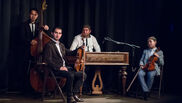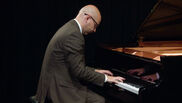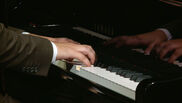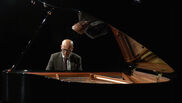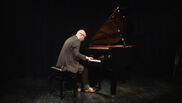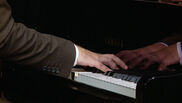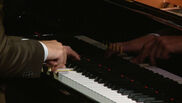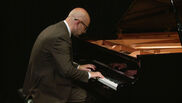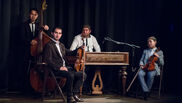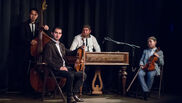Living Book Holocaust Ďusi band Schindler's List
created: 10. 01. 2024 11:00 modified: 10. 01. 2024 11:01
The family band called Ďusi Band consists of Július Bandy Sr. and his three sons Kristián, Július, and the youngest Samuel. The cimbalom band from Prešov presents the best tradition of the Romani cimbalom groups with the high interpretive art of their members as well as the scope and genre richness of their repertoire. It consists of folklore typically Romani but also Slovak and other nations‘ and nationalities‘, the band also plays classical music and does well in playing music of the genres such as jazz, pop or film tunes. The performance of the composition I Could Have Done More was recorded during the Living Book on the Holocaust event, in Prešov, on September 27, 2018.
Musical instruments and musicians who play them
Violin (primas) - Samuel Bandy
Double bass - Július Bandy Jr.
Viola - Kristián Bandy
Dulcimer - Julius Bandy Sr.
category: music
tags: instrumental classic contemporary quartet borrowed Ďusi Band general audience internal
Miroslav Rác - The Crying Heart
created: 09. 01. 2024 14:28 modified: 09. 01. 2024 14:31
Miroslav Rác is a pianist, music teacher, composer. For several years now, he has been working on the theme of the Roma Holocaust. As a concert artist, he played on several world stages in Europe and in Israel.
The composition titiled The Crying Heart was created in 2019 and is dedicated to the victims murdered in the Treblinka concentration camp in Poland. A recording of his solo interpretation of the piece.
category: music
tags: instrumental classic contemporary solo author's craft Miroslav Rác general audience internal
Miroslav Rác - Soul
created: 09. 01. 2024 14:19 modified: 09. 01. 2024 14:21
Miroslav Rác is a pianist, music teacher, composer. For several years now, he has been working on the theme of the Roma Holocaust. As a concert artist, he played on several world stages in Europe and in Israel.
The composition Soul is dedicated to the victims murdered in concentration camp Auschwitz-Birkenau.
category: music
tags: instrumental classic contemporary solo author's craft Miroslav Rác general audience internal
Miroslav Rác - Reflection
created: 09. 01. 2024 14:01 modified: 31. 05. 2024 15:58
Miroslav Rác is a pianist, music teacher, composer. For several years now, he has been working on the theme of the Roma Holocaust. As a concert artist, he played on several world stages in Europe and in Israel.
The composition titled Reflection was created in 2016 as dedicated to the victims murdered in Auschwitz concentration camp.
category: music
tags: instrumental classic contemporary solo author's craft Miroslav Rác general audience internal
Miroslav Rác - Lament
created: 09. 01. 2024 11:37 modified: 09. 01. 2024 11:38
Miroslav Rác is a pianist, music teacher, composer. For several years now, he has been working on the theme of the Roma Holocaust. As a concert artist, he played on several world stages in Europe and in Israel.
The composition Lament was created in 2018, it is dedicated to the victims murdered in the concentration camp Majdanek in Poland.
category: music
tags: instrumental classic contemporary solo author's craft Miroslav Rác general audience internal
Miroslav Rác - Tears
created: 09. 01. 2024 11:24 modified: 09. 01. 2024 11:26
Miroslav Rác is a pianist, music teacher, composer. For several years now, he has been working on the theme of the Roma Holocaust. As a concert artist, he played on several world stages in Europe and in Israel.
He composed a piano composition called Slzy (Tears) in 2017, dedicating it to the victims who lost their lives in the Belzec concentration camp in Poland. This is a recording of his solo interpretation of the piece.
category: music
tags: instrumental classic contemporary solo author's craft Miroslav Rác general audience internal
Miroslav Rác - Synagogue
created: 08. 01. 2024 11:24 modified: 08. 01. 2024 11:26
Miroslav Rác is a pianist, music teacher, composer. For several years now, he has been working on the theme of the Roma Holocaust. As a concert artist, he played on several world stages in Europe and in Israel.
The composition Synagogue was created in 2014 as the author's personal prayer for all victims of holocaust.
category: music
tags: instrumental classic contemporary solo author's craft Miroslav Rác general audience internal
Miroslav Rác - Tormented Soul
created: 08. 01. 2024 11:21 modified: 08. 01. 2024 11:23
Miroslav Rác is a pianist, music teacher, composer. For several years now, he has been working on the theme of the Roma Holocaust. As a concert artist, he played on several world stages in Europe and in Israel.
The composition Tormented Soul was composed in 2018. It is dedicated to all victims murdered in the concentration camp Sobibor.
category: music
tags: instrumental classic contemporary solo author's craft Miroslav Rác general audience internal
Living Book Holocaust Ďusi band Hatikva (Jewish Anthem)
created: 27. 11. 2023 13:24 modified: 10. 01. 2024 11:09
Hatikva, Ha-Tikva — Israel's national anthem. Its lyrics express the hope of Jews to return to their country and their desire to live there in calm, peace and harmony (hatikva = hope in Hebrew). The lyrics was written in 1878 by Naftali Herz Imber (*1856, †1909) as poem, published in 1886 titled Tikvatenu (Our Hope). The author of melody is Samuel Cohen, the composer and immigrant from Moldova. He composed it as a popular Moldovan-Romanian folk melody, in which musical motifs from The Vltava, a composition which is a part of music cycle My Homeland by Bedrich Smetana. In time of 7th Zionist Congress in Basel (1905) it was already widely known and popular. Its status as the anthem of the Zionist movement was confirmed at the 18th Congres in Prague (1933). In 1948 it became the national anthem of the state Israel. In some communities, it is sung as the closing song of a thanksgiving service or after a meal.
The video is a recording of the instrumental interpretation of the song performed by the Roma band Ďusi Band.
The family band called Ďusi Band consists of Július Bandy Sr. and his three sons Kristián, Július, and the youngest Samuel. The cimbalom band from Prešov presents the best tradition of the Romani cimbalom groups with the high interpretive art of their members as well as the scope and genre richness of their repertoire. It consists of folklore typically Romani but also Slovak and other nations‘ and nationalities‘, the band also plays classical music and does well in playing music of the genres such as jazz, pop or film tunes. The Romani song Hatikvah in an instrumental version was recorded during the Living Book on the Holocaust event, in Prešov, on September 27, 2018.
Musical instruments and musicians who play them
Violin (primas) - Samuel Bandy
Double bass - Július Bandy Jr.
Viola - Kristián Bandy
Cimbalom - Julius Bandy Sr.
category: music
tags: instrumental modern folk quartet borrowed Ďusi Band general audience internal
Ďusi Band - The Romani Girl
created: 24. 11. 2023 10:56 modified: 24. 11. 2023 10:58
The song "The Romani Girl" has no known author, but since World War II it has been considered the anthem of the Slovak Roma. The lyrics is directly related to the suffering of Roma in labor and extermination camps.
The family band called Ďusi Band consists of Július Bandy Sr. and his three sons Kristián, Július, and the youngest Samuel. The cimbalom band from Prešov presents the best tradition of the Romani cimbalom groups with the high interpretive art of their members as well as the scope and genre richness of their repertoire. It consists of folklore typically Romani but also Slovak and other nations‘ and nationalities‘, the band also plays classical music and does well in playing music of the genres such as jazz, pop or film tunes. The Romani song Čhajori romaňi in an instrumental version was recorded during the Living Book on the Holocaust event, in Prešov, on September 27, 2018.
Musical instruments and musicians who play them
Violin (primas) - Samuel Bandy
Double bass - Július Bandy Jr.
Viola - Kristián Bandy
Cimbalom - Julius Bandy Sr.
category: music
tags: instrumental modern folk quartet borrowed Ďusi Band general audience internal




